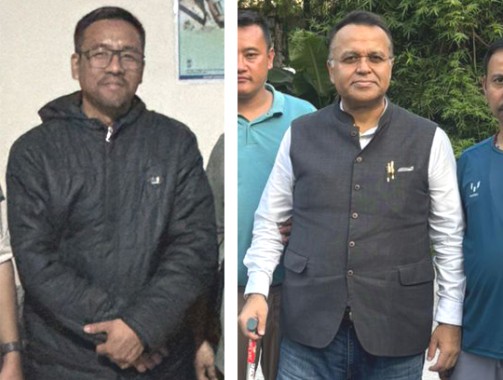




















Monday, Jun 09, 2025 22:30 [IST]
Last Update: Sunday, Jun 08, 2025 16:54 [IST]
DARJEELING,: The arrest of Gorkha Seva Sena (GSS) memers Bikramadi Rai and Subash
Mani Singh from the hills here by the Sikkim Police drew mixed reactions from the
political leaders here.
The duo
was arrested on Saturday in connection to an FIR against them along with Sikkim-resident
Noel Sharma for alleged violations including misrepresentation, unauthorized
use of official emblems, and actions deemed potentially harmful to public order
and the integrity of the State. The FIR had been filed on June 6 at the Gangtok
Sadar Police Station in Gangtok by the Sikkim Home Department.
Reacting
to the arrests, the Indian Gorkha Janshakti Front (IGJF) president Ajoy Edwards
said, “Though the IGJF may not endorse nor accept the idea of merging
Darjeeling with Sikkim as raised by the two, their arrest like common criminals
is deeply disturbing and leaves a bitter taste in our mouths.”
“When we
speak of Gorkhaland, Bengal Police throws us behind bars. Now, when two
individuals voice a controversial yet peaceful idea as an alternative to
Bengal’s oppression, Sikkim responds with arrests. Is this the fate of the
Gorkha people of the Darjeeling Hills to be silenced from all directions?”
questioned Edwards in his Facebook post.
The IGJF
leader urged the Sikkim Government if there is any case to be made it be
handled through diplomacy and the judiciary, not through handcuffs while at the
same time appealing to Bikram and Subash and all other proponents of the merger
issue, not to present “ourselves as a desperate people begging for refuge.”
Edwards
maintained that Sikkim had clearly and consistently rejected the idea of a
merger as seen across social media and in public discourse while maintaining
that the people here wanted Gorkhaland.
On the
other hand, Bharatiya Gorkha Prajatantrik Morcha (BGPM) leader Keshav Raj
Pokhrel said, “Freedom of expression is the beauty of a republic. In the
Darjeeling hills, a defamation case has been filed for the misuse of freedom of
expression, but no one has been imprisoned for it. Leaders and people are
accused of different things which are perhaps a symbol of the flourishing of
democracy in Darjeeling.”
“The
context of arresting and taking action against the leaders of the GSS may be
legal, but it is against democracy. The idea may not be acceptable, but the
constitution gives them the freedom to express their opinions,” he added.
The BGPM
leader also stated that he shared a different opinion from the GSS and
disagreed with them on their issues, principles, and activities. He said that
being Gorkhas they were brothers due to which he opposed the action taken
against them.
Meanwhile,
Darjeeling MLA and GNLF leader Neeraj Zimba was seeing giving justifications to
the arrests.
Zimba
said, “In a country where popular sentiment often overshadows legal nuance, the
line between protest and provocation is easily blurred. The recent arrest of
the Bikram and Subash by the Sikkim Police has become one such case. And as with
all matters where sentiment meets sovereignty, it has swiftly transcended its
legal scope to become a theatre of hurt, identity, and misunderstood intentions.”
Zimba also
in a Facebook post maintained that the sections in which the arrests had been
made are not casual clauses and was not invoked lightly. He alleges that the
public speeches, video interviews, social media posts made by them repeating
the idea of a merger between Darjeeling and Sikkim was “articulated not as an
academic provocation, but as a politically actionable proposition” with the
“tone not reflective but declarative” and “the words chosen not hypothetical, but
direct.”
“It is
here that the law draws a line. That line is not drawn to restrict dissent, but
to restrain disorder. Had this been a politically motivated arrest, the
government would have moved long ago against leaders of the Gorkha Rashtriya
Congress, who have raised similar propositions in the past but they were never
touched, because their engagement was rooted in discussion not mobilisation,
not agitation,” reasoned Zimba adding that the State had little choice but to
intervene not for vengeance, but for equilibrium and that what the Home department
of Sikkim had one was not an ideological overreach but a legal obligation. He
added that one should not make the mistake of casting every legal response as
political aggression.
“The
emotional and cultural bonds between Darjeeling and Sikkim are undeniable but
emotions do not rewrite constitutions and sentiment is not statute. Brotherhood
does not confer the right to propose political union without consent,” he said
while also maintaining that the people of Sikkim had firmly and publicly
rejected the merger idea.
